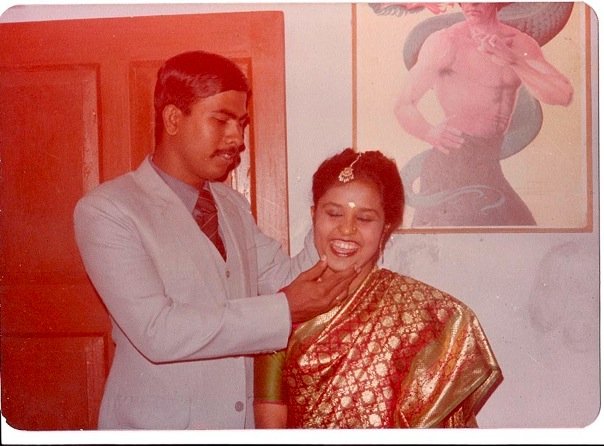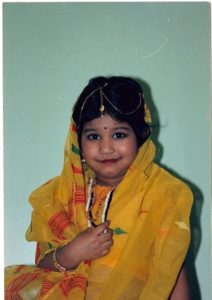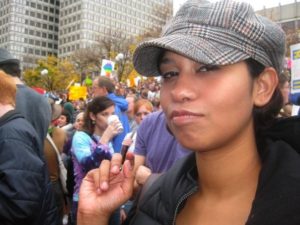
For most people, the first marriage they get to witness is their own parents’ marriage. It becomes the relationship that we judge all our relationships against. If it was a good marriage, we refuse to settle for anything less. If it was awful, we swear we will never follow in their footsteps. Our parents involuntarily provide us with the baggage we will carry from relationship to relationship. For me, my Bangladeshi parents provided me with enough baggage for a moving truck.
For as long as I can remember, they fought. At night before we all fell asleep in one room in our Queens apartment (we would rent the rest of the rooms out to new Bangladeshi bachelors needing a place to stay), they fought. Between my father’s line cook shift and his cab driver shift in the ’80s in NYC, they fought. After dinners of fish curry and white rice into the ’90s, they fought.
I wanted them to divorce and when I was old enough to tell them this (I believe I was all of eight years old), I did.
“Chee,” my mother said in disgust. “Divorce is American.”
It was a Westernized, white, absurd thing to do and they wouldn’t do it.
So the fighting continued. It was sometimes bloody and violent. Even I took a hit now and then. There were family vacations ruined by a silent, furious mother and an angry, unapologetic father. There were birthdays where one parent was missing. I had rarely seen them have a real conversation that wasn’t spiced with backhanded comments and outright insults.

“But then why did you marry him?” I’d ask my mother over and over.
“Because it’s what you did back then,” she’d tell me. “You marry, you have kids, end of story.”
I left at 18, something very few Bangladeshi daughters did, after a particularly horrifying fight. I needed to leave for me and refused to apologize for it (though I was guilt-ridden and ashamed).
I had relationships with both men and women. I struggled to understand how to be with someone despite not knowing myself. I was usually dramatic, flaky, and if anything went wrong — well, I’d fight. I’d scream and walk out, I’d grab a knife and threaten to end it all, I’d text them sorry only to start the cycle again. There was abuse and toxic situations I should not have let myself stay in. I spent my 20s unable to find anything healthy because, truth be told, I had no idea what “healthy” looked like.
Yet none of those awful relationships in college and law school ever broke my heart like my parents did.
By the time I moved home again a few years ago, at the dismay of all my aunties and my grandparents, I scoffed at the idea of ever putting a ring on my finger. What was the point? I had read and re-read in law school the legal implications of getting married and agreed there were some benefits — but not enough for me to get stuck in what I saw as a miserable cycle of fighting and tears.
But I admit — have been changing. Slowly.
It was while reading about New York legalizing same-sex marriage in 2011 when I began to think about marriage differently. Though while in school I had marched at rallies and protests hoping to get same-sex marriage legalized everywhere, I always looked at it from a legal standpoint: absolutely nothing in the Constitution could deny anyone in this country from marrying whichever gender they chose. Allowing same-sex marriage is just allowing a minority group to have the same civil rights as everyone else — isn’t that what America, the country my own parents wanted to make a fresh start in, is all about? Marriage is a right, unobstructed by religion or personal beliefs (even my own ridiculously jaded beliefs). I knew that same-sex marriage would have enormous economic benefits both for the country and for the people involved. It was a step in the right direction and I had always supported it.

However, until that moment, sitting in front of my computer on a rainy afternoon staring at a picture of two women in front of NYC’s city hall staring lovingly at each other, I never let myself learn from all these beautiful people I was fighting for. For the first time I took off my legal glasses and put on some human ones. I looked at them and thought about what I was missing from shutting myself off to the possibility of entering into a legal contract with someone and doing it for love.
These were people who weren’t being pushed together by any social forces like I thought my parents were. They weren’t in it to wear a wedding gown or to eat cake. Their love had survived despite a world that seemed to be working against them, despite a legal system that hadn’t caught up to their love. They wanted to get married because they truly wanted to get married.
How had I failed to see past my moving truck full of baggage and at all these other men and women who were proving to me that not all marriages were death traps? Why had I always been so scared to see that there was a side of marriage — a side that was quite different from the Kardashian/Britney Spears marriages in the tabloids, different from the one I grew up watching?
So for the last few years, I have been changing. Part of this is because I’ve seen and heard the stories of so many loving couples from the 12 (12!) states where gay marriage is now legal, and part of it comes from opening myself up to the love of a man that helped melt the ice around my heart. I have learned that relationships might take work but some of them are worth the labor. I have learned that two people, regardless of gender or race or sexuality, can come together in a way I hadn’t realized growing up. I understand now how beautiful it is to wake up next to someone and know you want to do that for the rest of your life. I know now what it is that couple in front of NYC ‘s city hall must have been feeling.
The victories of same-sex marriage aren’t ruining the institution of marriage as some people would like you to believe — they’re strengthening, bettering, and breathing life back into the institution in ways even I hadn’t realized. And that’s a fight worth fighting.
R. Melissa Masoom is a law school grad, crazy cat lady, terrible singer, mediocre cook, and someone who thinks laughter is the answer to all the world’s problems. You can find her on Twitter at @rmelissamasoom or on her personal blog, where a version of this essay originally appeared.












